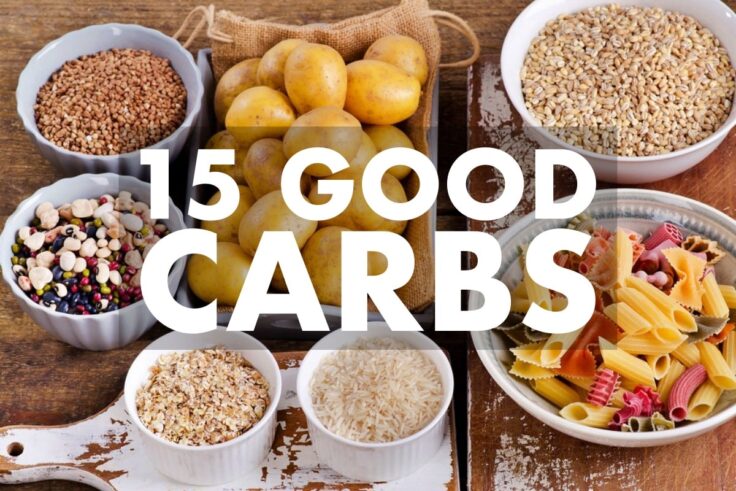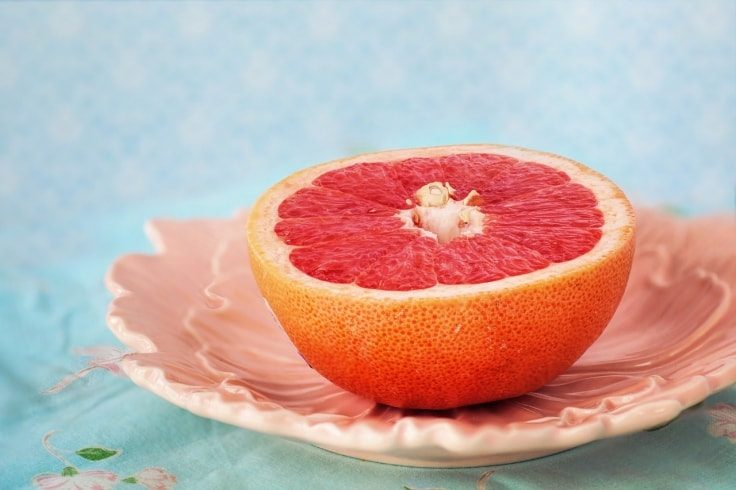15 High-Carb Foods That Are Actually Healthy

From oats and quinoa to bananas and grapefruits, boost your health with these 15 tasty high-carb foods. Start eating smarter today!
Carbs have been given a bad rap over the years. They’re often blamed for causing weight gain, type 2 diabetes, and a whole host of other health issues. But hold on a second, there’s more to the story.
Sure, sugary and refined grain-filled processed foods aren’t exactly nutritional powerhouses. But, not all carb sources are created equal.
In fact, many high-carb foods are actually bursting with nutrients and fiber, which can be really good for you.
Now, before you go ditching all the carbs, know that low-carb diets can be helpful for some folks. But you don’t have to banish all carbs from your plate either.
So, let’s give carbs some love!
15 Surprisingly Healthy High-Carb Foods
Here are 15 high-carb foods that are both delicious and nutritious:
1. Oats

Now, you may be thinking, “Aren’t carbs the enemy?” Not when it comes to oats!
Raw oats are mostly carbs, but they’re packed with 8 grams of fiber per cup, and a specific type called oat beta-glucan, which is great for heart health.
And get this, oats also have more protein than most grains.
Studies have found that eating oats can reduce the risk of heart disease and lower blood sugar levels, especially in folks with type 2 diabetes. Plus, they’re filling, which could help keep your weight in check.
2. Kidney Beans

With about 21.5 grams of carbs per 100 grams, cooked kidney beans are packed with starch, fiber, and protein.
These beans also offer many vitamins, minerals, and antioxidant compounds like anthocyanins and isoflavones.
Eating kidney beans can help regulate blood sugar and lower the risk of colon cancer.
Plus, they make a delicious addition to any dish.
3. Quinoa

Quinoa is technically a pseudocereal, which means it’s a seed that’s cooked and eaten like a grain.
But don’t let that fool you, quinoa is a carb powerhouse, with 70% of its makeup being carbs.
Now, here’s the kicker: it’s also high in protein and fiber, making it a filling and nutritious option.
Quinoa is loaded with good stuff like minerals and plant compounds, and studies have shown it can improve blood sugar and heart health.
Bonus points: it’s gluten-free, making it a popular wheat alternative.
And let’s not forget about the filling factor. Thanks to its protein and fiber content, quinoa can help you manage your weight and keep your gut happy.
4. Brown Rice

Speaking of rice… This nutty-flavored grain is a whole grain that’s jam-packed with fiber, vitamins, and minerals. But wait, there’s more!
Brown rice is an excellent source of manganese, a mineral that helps with bone development and wound healing.
It’s also rich in selenium, which is essential for thyroid function and a healthy immune system.
Research shows that people who consume more whole grains, like brown rice, have a reduced risk of heart disease compared to those who consume more refined grains.
5. Beets

Beets, aka beetroots, may not be the highest in carbs, but for a non-starchy veggie, they pack a punch.
With 10g of carbs per 100g, mainly from sugar and fiber, they’re also chock-full of vitamins, minerals, and antioxidants.
Beets are rich in inorganic nitrates that convert to nitric oxide, which lowers blood pressure and could help prevent diseases.
Athletes sometimes drink beet juice to boost their performance because nitric oxide helps oxygen flow efficiently during exercise.
6. Buckwheat

Despite its name, buckwheat is not related to wheat and it’s gluten-free, making it a great option for those with a wheat allergy or gluten sensitivity.
Raw buckwheat is carb-heavy with 75 grams, but when cooked it comes down to a reasonable 19.9 grams per 100-gram serving.
Buckwheat is also a nutrition powerhouse, packed with protein, fiber, minerals, and antioxidants.
Studies have shown that buckwheat can do wonders for heart health and blood sugar regulation.
7. Lentils

Not only are lentils a great source of plant-based protein, but they’re also rich in fiber, iron, folate, and several other vitamins and minerals.
One cup of cooked lentils provides around 18 grams of protein and 15 grams of fiber. That’s more fiber than a slice of whole-grain bread!
Lentils have also been linked to improved heart health, likely due to their high fiber content which can help lower cholesterol levels.
Additionally, lentils have a low glycemic index which means they don’t cause a spike in blood sugar levels after eating, making them a great option for those with diabetes or anyone looking to manage their blood sugar levels.
8. Chickpeas

Chickpeas, aka garbanzo beans, are legumes that pack a carb and fiber punch.
Cooked chickpeas contain 27.4 grams of carbs per 100 grams and 8 grams of fiber. They also provide plant-based protein and are rich in iron, phosphorus, and B vitamins.
Eating chickpeas may benefit your heart and gut. Plus, some studies show they could potentially help fight cancer. But before you start stuffing your face with chickpeas, keep in mind more research is needed.
9. Corn

This is a staple food for many cultures around the world. It comes in a variety of colors, including yellow, white, red, and even blue, making it a colorful addition to any meal.
One of the main benefits of corn is its high fiber content. Fiber helps keep your digestive system running smoothly and can even lower your risk of certain diseases, such as heart disease and colon cancer.
Corn also contains a variety of antioxidants, which help protect your cells from damage caused by harmful molecules known as free radicals.
But that’s not all! Corn is also rich in several important vitamins and minerals, such as vitamin B6, magnesium, and potassium.
- Vitamin B6 is essential for brain development and function.
- Magnesium is important for bone health and nerve function.
- Potassium, on the other hand, helps regulate blood pressure and fluid balance in the body.
Studies have shown that consuming corn can lead to improved heart health, as well as better digestion.
The fiber in corn helps regulate blood sugar levels, which can lower your risk of developing type 2 diabetes.
Additionally, the antioxidants in corn can help reduce inflammation throughout your body, which is associated with many chronic diseases.
10. Sweet Potatoes

Sweet potatoes are loaded with carbs (20.7 grams for every 100 grams of cooked sweet potatoes). This includes starch, sugar, and fiber.
But sweet potatoes are also chock-full of vitamin A, vitamin C, and potassium, making them a serious nutritional powerhouse.
And let’s not forget about those antioxidants. Sweet potatoes are loaded with ’em, which means they can help protect your cells from pesky free radicals that can lead to chronic diseases.
So, next time you’re thinking about reaching for that bag of chips, swap ’em out for some sweet potato fries.
11. Bananas

Ah, the banana. The OG of fruits. You can slice ’em, dice ’em, mash ’em up…the possibilities are endless!
But did you know that one large banana has about 31 grams of carbs? Don’t worry, though, they’re mostly in the form of starches and sugars that your body can use for fuel.
Bananas are also loaded with potassium and vitamins B6 and C, as well as other compounds that do your body good.
Speaking of doing your body good, bananas can actually help lower blood pressure and improve heart health, thanks to all that potassium.
Pro tip: if you’re looking for more starch and less sugar, go for the unripe, green bananas. As they ripen and turn yellow, the starch turns into natural sugars.
12. Blueberries

Blueberries are the superstars of berries, packed with antioxidants. They’re 85% water and have 14.5 grams of carbs per 100 grams, as well as vitamin C, vitamin K, and manganese.
They also have special compounds that fight free radicals, which can harm your body.
Plus, experts recommend blueberries to help improve memory in older adults.
13. Oranges

Ah, the classic citrus fruit. Oranges are 15.5% carbs by weight and are also high in fiber.
Oranges are packed with vitamin C, potassium, some B vitamins, and antioxidants.
By eating oranges, you can potentially improve heart health, prevent kidney stones, and boost iron absorption. Plus, they’re a tasty way to get hydrated!
14. Apples

Apples contain around 14-16 grams of carbs per 100 grams, along with some vitamins and minerals.
Apples are a great source of vitamin C, fiber, and antioxidants, which can help improve blood sugar management and heart health.
Early studies also suggest that eating apples may lower the risk of certain cancers, but more research is needed to confirm this.
15. Grapefruits

Grapefruit is a bittersweet citrus fruit that’s packed with nutrients, including about 8% carbs.
It’s loaded with vitamins, minerals, and antioxidants. Some studies show that grapefruit can boost heart health and help manage blood sugar.
There’s also promising research on how certain grapefruit compounds may prevent kidney stones, reduce cholesterol, and even slow down cancer cell growth.
The Takeaway
We’ve covered a variety of high-carb foods that are not only delicious but also packed with health benefits.
From the colorful and juicy berries to the starchy yet nutritious sweet potatoes, there’s a high-carb food for everyone’s taste buds.
But let’s not forget that not all high-carb foods are created equal. Some, like the refined and processed carbs found in sugary drinks and snacks, can do more harm than good.
So, if you’re looking to incorporate high-carb foods into your diet, remember to choose whole, unprocessed versions like fruits, vegetables, and whole grains.
And don’t be afraid to experiment with new recipes and flavor combinations to keep things interesting.
With a little bit of knowledge and creativity, you can enjoy the benefits of high-carb foods without sacrificing taste or your health. Happy eating!